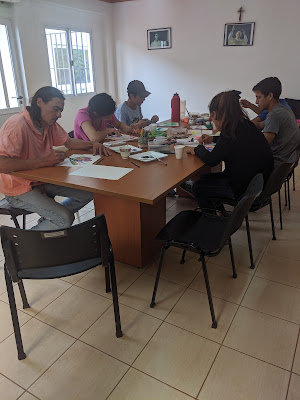Cáritas Addiction Ministry: Being 'Seen'
 |
| Participants paint in an art workshop at Cáritas Addiction Ministry (Photo taken with participant permission) |
One of the things I first noticed about Angela was the way that she hugged people. She holds you for a while in her arms and closes her eyes, signalling this isn't a normal goodbye hug. When she hugged me for the first time, I hadn't had such a tender moment with someone since leaving for Chicago; crying in the arms of my parents at the airport, I was overwhelmed by the reality of leaving for an entire year. Sometimes I can feel suffocated by a hug, but with Angela I almost wept with gratitude. Adjusting to my new life in Argentina had been emotionally taxing and physically draining for many months. In that hug, I felt acknowledged, important, and safe.
Angela does patient intake at Cáritas' Pastoral de Adiciones (Addiction Ministry). The program is funded by the Catholic Diocese of Oberá, and my Lutheran church community, Iglesia Olaus Petri, has made the commitment to provide support in the form of volunteers and monetary donations. The volunteer doctors, pyscologists, and social workers that come in on Monday and Thursday mornings see patients in all stages of drug and/or alcohol abuse. Some weeks a lot more people than normal walk into the Bishop's courtyard to be seen, but everyone takes it in stride- with the help of a lot of mate, or Argentina's signature highly-caffeinated tea, of course. Angela and the other mainstay Caritas' volunteers happily greet and joke with the folks coming in for treatment. As they pull out health history files, send people in to see the health professionals, and put out more snacks, you can feel the distinctly Argentine sense of unhurried, relaxed progress.
 |
| Paintings from the art workshop are displayed on the program's filing cabinets in the main gathering room |
When I come on Thursdays, I make new blank health history files, chat and play cards (mostly Uno) with people waiting to be seen. If specialists like art therapists come to volunteer, I help them run their activity. The picture above shows the acrylic paintings of some of the patients who participated in the art workshop last month. Initially, I was skeptical of how much effort the patients were going to give to the painting exercise. While I had engaged in friendly chats with several of them, I figured they might act too cool for it all and make a joke out of being artistic. I quickly learned how wrong my assumption was when one of the women requested Vivaldi be played as she filled in the freeform shapes on her page with vibrant colors.
Assumptions like my own are what make people wary of volunteering with this segment of the population. The majority of people coming to the ministry are males in their late teens and twenties, but kids as young as 8, women, and older folks also seek treatment. Many have other criminal offenses due to their addiction and have hurt friends and family around them. Working with addiction also means constantly having to deal with relapse, backsliding, and even death. These realities make it emotionally difficult for folks to make the commitment to help.
It breaks my heart to think that someone who comes in for treatment on Thursday could be back to destructive behaviors by Friday morning. However, the thought of this program not existing just because its impossible to be 100% effective in treating everyone is even sadder. The volunteers of Caritas promote human dignity by showing up every week to help. They are a stable support system demonstrating to patients that their journey through addiction is important, and that they are worth so much more than their personal demons. Their commitment is an echo of God's unfailing and merciful love.
One Thursday, I was about to leave the Bishop's office and was feeling a little down about my participation that day. It was rainy, so few people had shown up to be seen and I had only talked with one person in what I felt was very halted Spanish. As I said my goodbyes, one of the intake volunteers held my shoulders and without any prompting said, "Querida (love), it's always important that you come. It's important for them to know you'll be here." As I've come to learn, sometimes ministry is just making the commitment to show up and listen, to make people feel seen and heard. And as anyone who's received a hug from Angela can tell you, that acknowledgement is a powerfully transformative thing.
Chaucito,
Ann Emilie
❤
ReplyDeleteI enjoyed reading this. Loved Angela's hug and how that made you feel, loved the artwork and just the fact that you are showing up everyday. Well done, Ann Emilie!
ReplyDeleteHugs like Angela’s are hugs from God. We are so blessed to receive that. Thank you for what you do and sharing yourself with those in need.
ReplyDelete